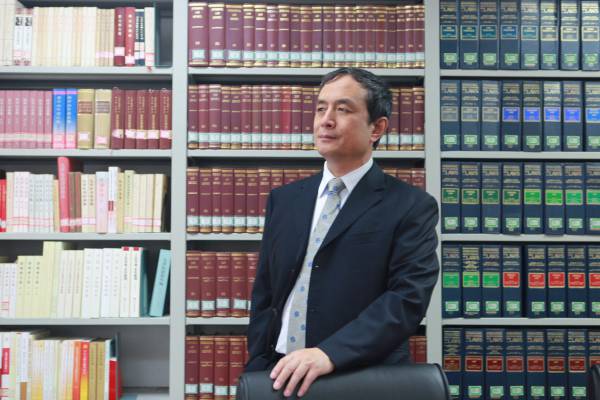Chen Su, a native of Dalian City, Liaoning Province; a member of CASS; a research fellow and doctoral supervisor at CASS Law Institute; currently the editor-in-chief of Chinese Journal of Law, chairman of the Professional Title Evaluation Committee of CASS Law Institute and CASS Institute of International Law; and dean of the Law Faculty of CASS Graduate School.
He performed military service in the Northeast Region of China from December 1976 to December 1980; became a worker in Dalian General Enamel Factory after demobilization; admitted to the Law Faculty of Liaoning University in 1981 and obtained the degree of Bachelor of Law in 1985; admitted to the CASS Graduate School in 1985 and obtained the degree of Master of Law in 1988; began to work at CASS Law Institute as a researcher in civil and commercial law in August 1988; held the positions of the deputy head and the head of the Commercial and Economic Law Department of CASS Law Institute, the deputy director of CASS Law Institute, the secretary of the joint Party Committee of CASS Law Institute and CASS Institute of International Law, and the director of CASS Law Institute.
The main research areas of Professor Chen Su are economic law and civil and commercial law. He key research areas include basic theory of economic law, basic theory of commercial law, company law, securities law and real law. In the area of company law, he has made indepth research on the company capital system, the structure of corporate governance, and the system of connected transaction; in the field of property rights law, he specializes in the study of the condominium ownership system, the system of the right to the use of land, and the system of the right to the use sea areas. Main publications include: Monographic Studies on Securities Law (editor-in-chief), Research on the Spirit of Law, Studies on Contemporary Legal Science in China (editor-in-chief), New Development in Sociology of Law (editor-in-chief), Construction of the Rule of Law in China against the Background of Globalization (execuitive editor-in-chief). He has also published dozens of articles in various academic journals, including Chinese Journal of Law, China Legal Science, Columbia Journal of Asian Law (U.S.), and State and Law (Russia).
Professor Chen Su has led or participated in many major research projects, including Research on the Legal System of Property Rights in China, Legal Safeguards against Financial Risks, Research on Basic Theory of Economic Law, Studies on the Mechanism for the Legal Protection of Disadvantaged Groups in the Society, the Reform of IPR Enforcement System, and Research on the System of Laws and Regulations on the Cultivation of Qualified Personnel.
Professor Chen Su also actively participates in legislative activities. He was a member of Expert Group on the Revision of the Company Law under the Legal Affairs Office of the State Council during the revision of the Company Law, a member of Expert Group on the Revision of Securities Law set up by the Financial and Economic Committee under the National People's Congress. He participated in the expert demonstration organized by state legislative organs on the drafts of the Property Rights Law, the Labour Contract Law, the Law on Mediation and Arbitration of Labour Disputes, the Law on Partnership Enterprise, the Law on Specialized Farmers Cooperatives, the Law on Arbitration of Land Contract Disputes, the Energy Law, and the Law on State-Owned Assets of Enterprises, and submitted written opinions on dozens of draft laws, administrative regulations and local regulations.
Professor Chen Su mainly teaches courses in commercial law, including company law, securities law and law on negotiable instruments, which are popular among students. Apart from supervising doctoral students at the CASS Graduate School, he had also participated in the defense and evaluation of over one hundred doctoral theses in Peking University, Remin University of China, Tsinghua University, China University of Political Science and Law, and University of International Business and Economics.




